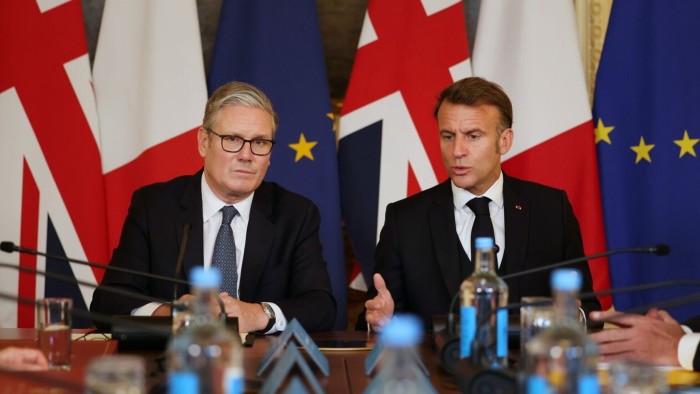Unlock the Editor’s Digest for free
Roula Khalaf, Editor of the FT, selects her favourite stories in this weekly newsletter.
A lot has changed since 2022, when Britain’s then-aspiring prime minister Liz Truss, after the tensions of Brexit, said “the jury’s out” on whether Emmanuel Macron was friend or foe. A successor as prime minister, Sir Keir Starmer, has this week welcomed the first state visit by a French president since 2008, and the first by a European leader since the UK’s EU exit, with a warmth and pomp that reflects a realisation that Britain needs friends — and that outside the bloc, it has to work harder to cultivate them bilaterally. With Donald Trump’s US pressing Europe to take more responsibility for its own defence, the trip has helped to revitalise a relationship that should be a motor of European co-operation.
Much coverage of Macron’s visit has focused on the small boats migrants whose numbers have reached a record 21,000 so far this year. The trial “one in, one out” scheme he agreed with Starmer — allowing the UK to send up to 50 migrants a week back to France, and France to send a similar number the other way provided they have a legitimate right to be in Britain — is a small step forward in deterrence.
Important as controlling irregular migration is to both countries, however, this issue must not be allowed to dominate the relationship. It should be defined above all by what Macron called the two nations’ “special responsibility” for the security of the continent.
True, Germany under Friedrich Merz plans to spend big on rearmament; France and Britain’s armed forces remain below their historical strength due to periods of underspending. Yet they are still Europe’s most capable military powers — and the continent’s only nuclear ones. The need to square Britain’s Atlanticist instincts with the French commitment to European strategic autonomy reflects the balance Europe as a whole must strike in preserving strong defensive ties with the US while expanding its own capabilities. In the medium term, as Macron suggested, European defence depends on Franco-British leadership.
Starmer and Macron have already displayed this by spearheading efforts to assemble a “reassurance” force in the event of a Ukraine ceasefire. They co-chaired a videoconference of this “coalition of the willing” from Nato’s Northwood command centre on Thursday.
But perhaps the biggest breakthrough this week was the declaration that the two nations are now prepared to co-ordinate their independent nuclear deterrents and respond jointly to protect Europe from any “extreme threat”. French autonomy over its nuclear arms has long been an article of faith. Both arsenals are dwarfed by those of Russia or the US. Yet amid questions over America’s commitment to use its nuclear umbrella to protect Europe, the prospect of increased Anglo-French nuclear co-ordination will make their deterrence more credible.
There were welcome advances in conventional co-operation, too. They include an expanded Combined Joint Force to counter threats in Europe, and an “entente industrielle” to step up work on a new cruise missile to replace the Storm Shadow/Scalp, and projects to develop advanced anti-drone weapons.
The UK-French advances highlight, too, how defence is one area where Britain could rebuild relations with the EU more broadly, less constrained by the red lines on both sides that have limited the recent trade and economic rapprochement. While the EU will never replace Nato’s responsibility for the collective defence of Europe, it has a growing role in funding rearmament and organising joint procurement. After banishing some of the froideur with the French, Britain should use the relative strength of its armed forces and defence industry to do something similar with the EU as a whole.
